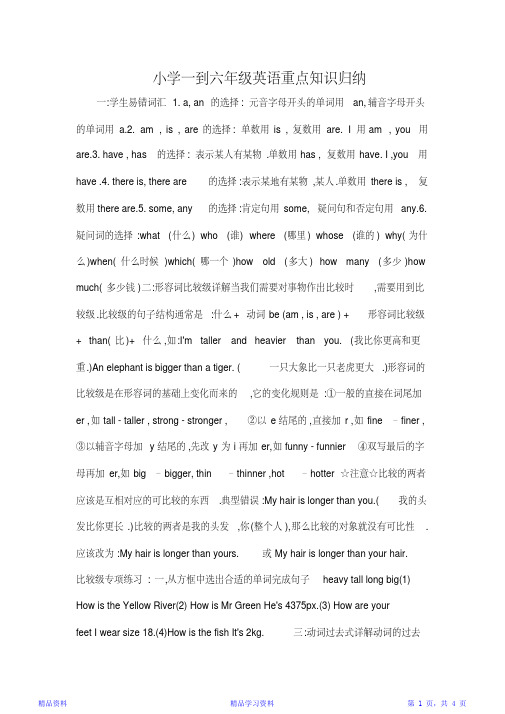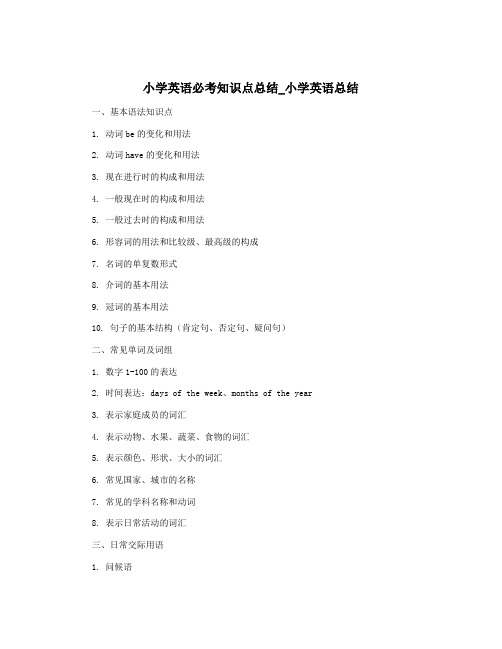小学英语重点词汇归纳总结
小学生必备的英语常用词汇总结

小学生必备的英语常用词汇总结英语是全球通行的语言,掌握好英语常用词汇对小学生学习英语非常重要。
本文将为大家总结一些小学生常用的英语词汇,帮助他们更好地掌握英语。
1. Greetings(问候语)问候语是我们日常交流中经常使用的一部分,以下是一些常见的英语问候语:- Hello!(你好!)- Hi!(嗨!)- Good morning!(早上好!)- Good afternoon!(下午好!)- Good evening!(晚上好!)- How are you?(你好吗?)- Nice to meet you!(很高兴见到你!)2. Numbers(数字)掌握好数字对于我们的生活和学习非常重要,以下是一些常见的英语数字:- One, two, three, four, five(一、二、三、四、五)- Six, seven, eight, nine, ten(六、七、八、九、十)- Eleven, twelve, thirteen, fourteen, fifteen(十一、十二、十三、十四、十五)- Twenty, thirty, forty, fifty, sixty(二十、三十、四十、五十、六十)- One hundred, two hundred, three hundred(一百、二百、三百)3. Colors(颜色)学习英语中的颜色可以让我们更好地描述事物,以下是一些常见的英语颜色:- Red(红色)- Blue(蓝色)- Green(绿色)- Yellow(黄色)- Orange(橙色)- Purple(紫色)- Pink(粉红色)- Brown(棕色)- Black(黑色)- White(白色)4. Animals(动物)了解一些常见的英语动物词汇可以帮助我们更好地了解动物世界,以下是一些常见的英语动物:- Dog(狗)- Cat(猫)- Elephant(大象)- Lion(狮子)- Giraffe(长颈鹿)- Tiger(老虎)- Monkey(猴子)- Rabbit(兔子)- Horse(马)- Bird(鸟)5. Food(食物)食物是我们生活中必不可少的一部分,以下是一些常见的英语食物:- Apple(苹果)- Banana(香蕉)- Orange(橙子)- Mango(芒果)- Bread(面包)- Rice(米饭)- Noodles(面条)- Pizza(比萨饼)- Ice cream(冰淇淋)- Chocolate(巧克力)6. School(学校)学校是小学生们度过大部分时间的地方,以下是一些与学校相关的英语词汇:- Classroom(教室)- Teacher(老师)- Student(学生)- Desk(课桌)- Chair(椅子)- Book(书)- Pen(钢笔)- Pencil(铅笔)- Ruler(尺子)- Schoolbag(书包)7. Daily routine(日常生活)了解日常生活中的一些常见词汇可以帮助我们更好地描述自己的生活,以下是一些常见的英语词汇:- Wake up(起床)- Brush teeth(刷牙)- Take a shower(洗澡)- Eat breakfast(吃早饭)- Go to school(去学校)- Study(学习)- Play games(玩游戏)- Do homework(做作业)- Have dinner(吃晚饭)- Go to bed(睡觉)8. Family(家庭)家庭是小学生们最亲近的地方,以下是一些与家庭相关的英语词汇:- Mother(妈妈)- Father(爸爸)- Brother(兄弟)- Sister(姐妹)- Grandmother(奶奶)- Grandfather(爷爷)- Aunt(阿姨)- Uncle(叔叔)- Cousin(表兄弟姐妹)- Family(家人)通过学习以上小学生常用的英语词汇,孩子们在日常生活和学习中将更加得心应手。
(小升初)小学英语常用词汇归纳

小升初小学英语常用词汇归纳一、学习用品( School Things)pen钢笔pencil铅笔pencil box铅笔盒ruler尺子book书bag包postcard明信片newspaper报纸schoolbag书包eraser橡皮crayon蜡笔sharpener卷笔刀storybook故事书notebook笔记本dictionary词典Chinese book语文书English book英语书Maths book 数学书magazine杂志comic book 漫画书二、身体部位(Body)head头face脸hair头发nose鼻子mouth嘴eye眼睛ear耳朵arm手臂hand手finger手指foot脚tail尾巴leg腿三、颜色( colors)red红色(的) blue蓝色(的) yellow黄色(的)white白色(的)green绿色(的)black黑色(的)orange橙色(的)purple紫色(的)brown棕色(的)pink粉色(的)四、动物( Animals)cat猫dog狗pig猪rabbit兔;野兔duck鸭horse马elephant大象ant蚂蚁fish鱼bid鸟snake蛇mouse老鼠kangaroo袋鼠monkey猴子panda大熊猫bear熊lion狮子tiger老虎fox狐狸zebra斑马deer鹿giraffe长颈鹿goose鹅turkey火鸡hen母鸡lamb小羊;羔羊sheep绵羊cow奶牛goat山羊seal海豹shark鲨鱼hippo河马五、人物( People)friend朋友boy男孩girl女孩father父亲;爸爸sister姐;妹mother母亲;妈妈aunt姑母;姨母brother兄;弟man男人uncle舅/叔/伯/姑父;Ms夫人woman女人Mr先生lady女十parents父母mum妈妈daughter女儿dad爸爸grandmother/ grandma(外)祖母son儿子cousin同辈表/堂亲baby婴儿kid小孩grandfather/grandpa(外)祖父king国王child小孩;儿童queen女王classmate同学principal校长visitor参观者pen pal笔友neighbour邻居tourist旅行者robot机器人六、职业(Jobs)teacher教师student学生worker工人doctor医生nurse护士driver司机postman邮递员farmer农民singer歌唱家reporter记者actor男演员actress女演员artist画家writer作家businessman商人/企业家engineer工程师cleaner清洁工policeman(男)警察policewoman女警察police officer警察scientist科学家coach教练fisherman渔民assistant售货员pilot飞行员七、饮食( Food and Drink)breakfast早餐lunch中餐dinner./ supper晚餐egg鸡蛋ice米饭cake蛋糕bread面包cookie小甜点biscuit饼干sausage香肠sandwich三明治dumplings饺子tofu豆腐meat肉chicken鸡肉beef牛肉mutton羊肉pork猪肉fish鱼hamburger汉堡hot dog热狗noodles面条salad沙拉up汤milk牛奶water水ice cream冰激凌cola可乐juice果汁tea茶coffee咖啡wine酒八、水果( Fruit)apple苹果banana香蕉pear梨orange橙watermelon西瓜grape葡萄cherry樱桃lemon柠檬mango芒果coconut椰子peach桃strawberry草莓九、蔬菜( Vegetables)eggplant茄子green bean青豆tomato西红柿potato土豆cucumber黄瓜onion洋葱carrot胡萝卜cabbage卷心菜pumpkin南瓜sweet potato红薯pea豌豆十、衣服( Clothes)skirt短裙jacket夹克衫shirt衬衫T-shirt T恤衫jeans牛仔裤pants/ trousers裤子socks袜子dress连衣裙sweater毛衣coat上衣raincoat雨衣shoes鞋子boots靴子hat帽子鸭舌帽shorts短裤scarf围巾gloves手套sunglasses太阳镜tie领带十一、交通工具( Vehicles)train火车boat小船bike/bicycle自行车bus公共汽车taxi出租车ship(大)船yacht游艇;快艇car小汽车plane飞机subway地铁jeep吉普车van小货车十二、杂物( Other things)desk课桌chair椅子window窗户door门blackboard黑板fan风扇bed床computer计算机teachers desk讲台picture图画photo照片light电灯mirror镜子football足球wall墙floor地板phone电话sofa沙发present/gift礼物lamp台灯table桌子TV电视shelf书架fridge冰箱curtain窗帘key钥匙lock锁plate盘子knife刀fork叉spoon句子chopsticks筷子pot锅doll玩具娃娃ball球puzzle谜;拼图box盒子balloon气球kite风筝umbrella伞zipper拉链violin小提琴yoyo溜溜球nest鸟窝hole洞toothbrush牙刷medicine药money钱e-card电子卡片email电子邮件traffic light交通灯toy玩具十三、地点( Locations)home家room房间bedroom卧室bathroom卫生间living room起居室/客厅kitchen厨房classroom教室school学校park公园library图书馆post office邮政局hospital医院cinema电影院bookstore书店farm农场zoo动物园garden花园playground操场canteen餐厅gym体育馆teachers' office教师办公室dining hall饭厅art room美术室computer room电脑房music room音乐教室university大学flat公寓company公司factory D厂pet shop宠物店bank银行city城市countryside乡村village村庄supermarket超市science museum科学博物馆十四、气象( Weather)cold冷的hot热的warm温暖的cool凉爽的snowy下雪的sunny晴朗的any下雨的windy刮风的cloudy多云的weather report天气预报十五、景物( Nature)land陆地sea大海river河流lake湖泊stream溪流forest森林path小路road马路house房子bridge桥building建筑物rain雨cloud云sun太阳太阳mountain大山sky天空rainbow彩虹wind风moon月亮air空气十六、植物( Plants)flower花grass草tree树seed种子plant植物leaf树叶rose玫瑰十七、星期(weeks)Monday星期一Tuesday星期二Wednesday星期三Thursday星期四Friday 星期五Saturday星期六Sunday星期日weekend周末十八、月份( Months)January一月February二月March三月April四月May五月June六月July七月September九月October十月August八月November十一月December十二月十九、季节( Seasons)spring春天summer夏天autumn秋天winter 冬天二十、方位(Directions)south南north北east东west西left左right右二十一、患病( Illness)have a fever发高烧hurt使)受伤have a headache头疼have a sore throat喉咙疼have a stomachache胃疼have a toothache牙疼have a cold 感冒二十二、数词(Numbers)基数词one一two二three三four四five五six六seven七eight八nine九ten十eleven十一twelve十二thirteen十三fourteen十四fifteen十五sixteen十六seventeen十七eighteen十八nineteen十九twenty二十thirty三十forty四十fifty五十sixty六十seventy七十eighty八十ninety九十hundred一百序数词first第一second第二third第三fourth第四fifth第五sixth第六seventh第七eighth第八ninth第九tenth第十eleventh第十一twelfth第十二二十三、形容词(adj.)原级:big大的small小的short短的;矮的young年轻的long长的tall/high高的thin瘦的old年老的;旧的active积极的strong强壮的kind善良的quiet安静的strict严格的nice好的sweet甜的smart聪明的salty咸的funny滑稽的favourite最喜爱的clean千净的sour酸的fresh新鲜的tried累的angry生气的happy高兴的excited兴奋的;激动的fine好的bored无聊的sad难过的great棒的heavy重的fat胖的new新的right对的hungry饿的little小的cute可爱的lovely可爱的beautiful漂亮的pretty漂亮的cheap便宜的colourful五颜六色的expensive昂贵的helpful有帮助的bad坏的healthy健康的easy简单的比较级:proud骄傲的taller更高的shorter更短的;更矮的stronger更强壮的higher更高的longer更长的younger更年轻的older更年长的bigger更大的heavier 更重的thinner更瘦的smaller更小的better好的十四、介词(prep.in在……里面on在……上面under在……下面near在……附近behind在(或向)……后面next to在……旁边over悬在…上面in front of在……前面above在(或向)……上面beside在旁边(附近)between在……中间十五、代词(pron.)I我we我们you你;你们he他she她it它they他(她/它)们my我的our我们的your你的;你们的his他的her她的二十六、动词/动词短语(verb.)(括号里为过去式)play玩swim(swam)游泳skate溜冰jump跳walk走run(ran)跑climb爬fight( fought)打架swing( swung)荡秋千eat(ate)吃sleep( slept)睡觉like喜欢have(had)有buy( bought)买take(took)拍(照);带live居住teach( taught)教go(went)去study学习Learn学习sing(sang)唱歌dance跳舞see(saw)看;看见guess猜help帮助pass传递show展示;给……看use用clean打扫open打开close关闭put(put)放read(read)阅读wit( wrote)写paint用颜料绘画tell(told)告诉kick踢stop停wait等find( found)找drive( drove)驾驶fold折叠send(sent)送;寄ride(rode)骑wash洗shine( shone)照耀become( became)变成feel(felt)感觉think( thought)想fall(fell)掉下leave(left)离开meet(met)遇见welcome欢迎thank谢谢wok工作drink( drank)喝taste尝smell(smelt)闻feed喂milk挤牛奶look看wear(wore)穿do homework做作业watch TV看电视cook the meals做饭water the flowers浇花clean the bedroom打扫卧室make the bed铺床sweep the floor扫地wash the clothes洗衣服set the table摆餐桌do morning exercises做早操wash the dishes洗碗碟use a computer用电脑eat breakfast吃早餐go to school去上学eat dinner吃晚饭get up起床have English class上英语课play sports做体育运动climb mountains爬山play the piano弹钢琴see a film看电影go shopping去购物fly kites放风筝visit grandparents拜访祖父母go hiking去远足make a snowman堆雪人draw pictures画画plant trees植树Cook dinner煮晚饭answer the phone接电话read a book看书listen to music听音乐write a letter写信clean the room打扫房间take pictures/photos照片write an email写电子邮件drink water喝水play chess下棋pick up leaves摘树叶write a report写报告have a picnic野餐bike骑自行车get to到达wake up醒来play the violin拉小提琴collect stamps集邮put on穿上get off下车take off脱下go to bed去睡觉hang up挂起来go home回家empty the trash倒垃圾play computer games玩电脑游戏do housework做家务put away the clothes 放好衣服read a magazine读杂志take a trip去旅行二十七、疑问词/词组what time几点what colour什么颜色what什么how old年龄多大;几岁what day星期几how怎样how many多少how much多少钱how tall多高how long多长how far多远how heavy多重whose谁的who谁how large面积多大when什么时候where在哪里why为什么which哪一个。
2023最新人教版小学一到六年级英语期末复习知识点总结

2023最新人教版小学一到六年级英语期末复习知识点总结小学一至六年级英语期末复习知识点总结一、词汇:1、动词及时态:(1)常见动词的过去式,包括:run-ran, swin-swam, go-went, take-took, come-came, put-put, make-made, find-found, eat-ate, give-gave, have-had, write-wrote, read-read, draw-drew, tell-told, understand-understood等。
2、形容词:(1)有“最”的形容词,比如:the tallest, the most beautiful, the nicest, the most patient等。
(2)有“发音不同”的形容词,比如:big/small, tall/short,thin/thick等。
3、名词:(1)指物的名词,比如:apple, orange, banana, car, bike, book, pencil等;(2)抽象名词,比如:time, people, music, art, education等;(3)地理名词,比如:China, America, United States, Japan, Sydney等;(4)职业名词,比如:teacher, doctor, artist, driver等。
4、代词:(1)人称代词,比如:I, you, we, they等;(2)物主代词,比如:my, your, our, their等;(3)指示代词,比如:this, that, these, those等。
5、冠词:(1)不定冠词a/an;(2)定冠词the,在某些情况下可以省略,如:At weekend.6、介词:(1)时间介词,比如:in, on, at;(2)地点介词,比如:to, from;(3)方式介词,比如:by, with;(4)其他介词,比如:of, for, like, under, behind等。
最全面小学一到六年级英语重点知识归纳(精华版)

小学一到六年级英语重点知识归纳一:学生易错词汇 1. a, an的选择: 元音字母开头的单词用an,辅音字母开头的单词用a.2. am , is , are的选择: 单数用is , 复数用are. I 用am , you 用are.3. have , has 的选择: 表示某人有某物.单数用has , 复数用have. I ,you 用have .4. there is, there are 的选择:表示某地有某物,某人.单数用there is , 复数用there are.5. some, any 的选择:肯定句用some, 疑问句和否定句用any.6. 疑问词的选择:what (什么) who (谁) where (哪里) whose (谁的) why(为什么)when(什么时候)which(哪一个)how old (多大) how many (多少)how much(多少钱)二:形容词比较级详解当我们需要对事物作出比较时,需要用到比较级.比较级的句子结构通常是:什么+ 动词be (am , is , are ) + 形容词比较级+ than(比)+ 什么,如:I'm taller and heavier than you. (我比你更高和更重.)An elephant is bigger than a tiger. (一只大象比一只老虎更大.)形容词的比较级是在形容词的基础上变化而来的,它的变化规则是:①一般的直接在词尾加er ,如tall - taller , strong - stronger ,②以e结尾的,直接加r ,如fine –finer ,③以辅音字母加y结尾的,先改y为i再加er,如funny - funnier④双写最后的字母再加er,如big –bigger, thin –thinner ,hot –hotter☆注意☆比较的两者应该是互相对应的可比较的东西.典型错误:My hair is longer than you.(我的头发比你更长.)比较的两者是我的头发,你(整个人),那么比较的对象就没有可比性.应该改为:My hair is longer than yours. 或My hair is longer than your hair.比较级专项练习: 一,从方框中选出合适的单词完成句子heavy tall long big(1) How is the Yellow River(2) How is Mr Green He's 4375px.(3) How are yourfeet I wear size 18.(4)How is the fish It's 2kg.三:动词过去式详解动词的过去式的构成规则有:A,规则动词①一般直接在动词的后面加ed:如worked , learned , cleaned , visited②以e结尾的动词直接加d:如lived , danced , used③以辅音字母加y结尾的动词要改y为i再加ed(此类动词较少)如study –studied carry –carried worry –worried (注意play,stay不是辅音字母加y,所以不属于此类)④双写最后一个字母(此类动词较少)如stoppedB,不规则动词(此类词并无规则,须熟记)小学阶段要记住以下动词的原形和过去式:sing –sang , eat –ate , see –saw , have –had , do –did , go - went , take - took , buy - bought , get - got , read - read ,fly - flew , am/is - was ,are -were , say - said , leave - left , swim - swam , tell - told , draw - drew ,come - came , lose - lost , find - found , drink - drank , hurt - hurt , feel -felt四:动词现在分词详解动词的ing形式的构成规则:①一般的直接在后面加上ing , 如doing , going , working , singing , eating②以e 结尾的动词,要先去e再加ing ,如having , writing③双写最后一个字母的(此类动词极少)有:running , swimming , sitting , getting五:人称代词六:句型专项归类 1.肯定句:是指用肯定的语气来陈述的句子,如:I'm a student. She is a doctor. He works in a hospital.There are four fans in our classroom. He will eat lunchat 12:00. I watched TV yesterday evening.2,否定句:含有否定词或表示否定意义词的句子,如:I'm not a student. She is not (isn't) a doctor.He does not (doesn't) work in a hospital. There are not (aren't) four fans in our classroom.He will not (won't) eat lunch at 12:00. I did not (didn't) watchTV yesterday evening.☆注意☆小结:否定句主要是在肯定句的基础上加上了否定词"not".有动词be的句子则"not"加在be后面,可缩写成"isn't,aren't",但amnot 一般都分开写.没有动词be的句子则要先在主要动词的前面加上一个助动词(do,does,did),然后在它后面加上"not",你也可以把它们缩写在一起如"don't , doesn't , didn't ).这三个助动词要根据人称和时态来选择,其中"does"只用于一般现在时主语是第三人称单数的情况,而"did"只用于一般过去时,不论主语是什么人称和数,都用"did" .3,一般疑问句:是指询问事实的句子,此类句子必须用"yes",或"no"来回答.如:Are you a student Yes, I am / No, I'm not.Is she adoctor Yes, she is. / No, she isn't.Does he work in a hospital Yes, he does./ No, he doesn't.Are there four fans in our classroom Yes, there are. / No,there aren't.Are you going to buy a comic book tonight Yes, I am. / No, Iam not. (Yes, we are. / No, we aren't.)Will he eat lunch at 12:00 Yes, I will. /No, I will not(won't).Are they swimming Yes, they are. / No, they aren't.Did you watch TV yesterday evening Yes, I did. / No, I didn't.☆注意☆小结:一般疑问句是在肯定句的基础上,①把动词be调到首位,其他照写,末尾标点符号变成问号即可.②没有动词be的句子则要在句首加上一个助动词(do,does,did)再把紧跟在后面的动词变回原形,末尾标点符号变成问号即可.这三个助动词也要根据人称和时态来选择,其中"does"只用于一般现在时主语是第三人称单数的情况,而"did"只用于一般过去时,不论主语是什么人称和数,都用"did" .一般疑问句有个重要的原则就是问和答要一致,即问句里的第一个单词(助动词)和简略答句里的这个词是一致的.4,特殊疑问句:以特殊疑问词(what , where , who , which , when , whose , why , how等)开头引导的句子.此类句子应该问什么就答什么,不能用"yes ,no"来回答.如:What is this It's a computer.What does he do He's a doctor.Where are you going I'm goingto Beijing.Who played football with you yesterday afternoon Mike.Whichseason do you like best Summer.When do you usually get up I usuallyget up at 6:30.Whose skirt is this It's Amy's.Why do you like spring bestBecause I can plant trees.How are you I'm fine. / I'm happy.How did yougo to Xinjiang I went to Xinjiang by train.☆其中how又可以和其他一些形容词连用组成特殊疑问词组用来提问,如: how many(多少(数量)), how much(多少(钱)), how tall(多高), how long(多长), how big(多大), how heavy(多重)例句:How many pencils do you have I have three pencils.How many girlscan you see I can see four girls.How many desks are there in your classroom There are 51.☆小结:how many 用来提问可数名词的数量,主要有以上三种搭配,How many + 名词复数+ do you have 你有多少……How many + 名词复数+ can you see 你能看见多少……How many + 名词复数+ are there…有多少……七:完全,缩略形式:I'm=I am he's=he is she's=she is they're=they are you're=you are there's=there is they're=they are can't=can not don't=do not doesn't=does not isn't=is not aren't=are notlet's=let us won't=will not I'll=I will wasn't=was not总结:通常情况下,'m即am,'s即is(但let's=let us), 're即are ,n't即not (但can't=can not)小学一到六年级英语重点知识归纳。
小学英语必考知识点总结_小学英语总结

小学英语必考知识点总结_小学英语总结一、基本语法知识点1. 动词be的变化和用法2. 动词have的变化和用法3. 现在进行时的构成和用法4. 一般现在时的构成和用法5. 一般过去时的构成和用法6. 形容词的用法和比较级、最高级的构成7. 名词的单复数形式8. 介词的基本用法9. 冠词的基本用法10. 句子的基本结构(肯定句、否定句、疑问句)二、常见单词及词组1. 数字1-100的表达2. 时间表达:days of the week、months of the year3. 表示家庭成员的词汇4. 表示动物、水果、蔬菜、食物的词汇5. 表示颜色、形状、大小的词汇6. 常见国家、城市的名称7. 常见的学科名称和动词8. 表示日常活动的词汇三、日常交际用语1. 问候语2. 表示喜欢或不喜欢的词汇3. 表示身体部位的词汇4. 表示情感的词汇5. 表示方向的词汇四、常见句型1. What’s this/that? It’s a/an…2. Is this/that a …? Yes, it is. / No, it isn’t.3. What colour is it? It’s…4. How many… are there? There are…5. What’s your/his/her name? My/His/Her name is…6. How old are you? I am … years old.7. Do you like…? Yes, I do. / No, I don’t.8. Where are you from? I am from…五、日常活动1. 描述日常活动的词汇及句子2. 描述日常活动的频率:always、usually、often、sometimes、never3. 表达日常活动所需的动词短语六、常见情景对话1. 自我介绍2. 询问年龄、姓名3. 询问喜欢的食物、颜色等4. 询问材料、颜色5. 询问位置、方向七、常见教学用语1. 教室用语和课堂指令2. 学习用具的名称3. 学习场所和物品的名称八、其他1. 常用生活用语和短语2. 主题相关的歌曲、儿歌和故事3. 形式多样的综合练习题,包括听力、口语、阅读、写作。
(超详)小学英语知识点归纳汇总

(超详)小学英语知识点归纳汇总
1. 语法知识点
- 主谓一致:主语和谓语动词在人称和数上保持一致。
- 形容词和副词的比较级和最高级:用于比较两个或多个事物的形容词和副词的变化形式。
- 名词的单复数:名词变化形式表示单数或复数。
- 时态:表示动作发生的时间,包括现在时、过去时和将来时等。
2. 词汇知识点
- 常用的基础词汇:包括数字、颜色、家庭成员、动物、食物等基本词汇。
- 动词:常用的动词及其过去式和现在分词形式。
- 名词:常见的名词及其单数和复数形式。
- 形容词和副词:用于描述事物的形容词和表示方式的副词。
3. 句型知识点
- 祈使句:用于表达命令、请求或建议的句子。
- 选择疑问句:用于提问时给出的选择项。
- 陈述句:陈述一个事实或描述一个情况的句子。
- 疑问句:用于提出问题的句子。
4. 阅读知识点
- 词义猜测:通过上下文推测词语的意思。
- 主旨理解:理解文章的中心思想或要点。
- 细节理解:理解文章中的具体细节信息。
- 推理判断:根据已有信息推断出未提及的信息。
以上是小学英语的一些基本知识点归纳汇总,希望对您有帮助!。
小学英语常用词汇总结

小学英语常用词汇总结在小学英语学习中,词汇是基础,是学习英语的重要组成部分。
通过掌握常用词汇,孩子们能够更好地理解和表达自己的意思。
本文将总结一些小学英语常用词汇,帮助孩子们扩充词汇量。
以下是一些常见的主题和词汇。
一、家庭和人物1. 父母:father, mother, dad, mom2. 兄弟姐妹:brother, sister, sibling3. 祖父母:grandfather, grandmother, grandpa, grandma4. 宠物:pet, dog, cat, fish二、学校和学习1. 教室和学校设施:classroom, blackboard, desk, chair2. 学科:subject, math, English, science3. 学习行为:study, read, write, listen4. 学习用品:book, pen, pencil, notebook三、动物和自然1. 动物:animal, cat, dog, rabbit2. 颜色:color, red, blue, yellow3. 天气:weather, sunny, cloudy, rainy4. 季节:season, spring, summer, autumn四、食物和饮料1. 水果:fruit, apple, banana, orange2. 蔬菜:vegetable, tomato, carrot, potato3. 食物:food, rice, bread, chicken4. 饮料:drink, water, milk, juice五、时间和数字1. 时间:time, clock, hour, minute2. 日常活动:activity, play, eat, sleep3. 天数:number, one, two, three4. 课程表:timetable, Monday, Tuesday, Wednesday六、交通工具1. 出行方式:transportation, bus, car, bike2. 路标:sign, stop, go, turn3. 车站:station, airport, train station, bus stop七、身体和健康1. 身体部位:body, head, hand, foot2. 健康:health, healthy, exercise, eat3. 疾病:illness, cold, fever, headache八、节日和庆祝活动1. 节日:festival, Christmas, New Year, Halloween2. 庆祝活动:celebration, party, cake, gift3. 火炬:torch, Olympic, sports, competition通过学习以上常用词汇,小学生可以提高自己的英语表达能力。
小学一到六年级英语重点知识归纳

小学一到六年级英语重点知识归纳一:学生易错词汇1. a, an的选择: 元音字母开头的单词用an,辅音字母开头的单词用a.2. am , is , are的选择: 单数用is , 复数用are. I 用am , you 用are.3. have , has 的选择: 表示某人有某物.单数用has , 复数用have. I ,you 用have .4. there is, there are 的选择:表示某地有某物,某人.单数用there is , 复数用there are.5. some, any 的选择:肯定句用some, 疑问句和否定句用any.6. 疑问词的选择:what (什么) who (谁) where (哪里) whose (谁的) why(为什么)when(什么时候)which(哪一个)how old (多大) how many (多少)how much(多少钱)二:形容词比较级详解当我们需要对事物作出比较时,需要用到比较级.比较级的句子结构通常是:什么+ 动词be (am , is , are ) + 形容词比较级+ than(比)+ 什么,如:I'm taller and heavier than you. (我比你更高和更重.)An elephant is bigger than a tiger. (一只大象比一只老虎更大.)形容词的比较级是在形容词的基础上变化而来的,它的变化规则是:①一般的直接在词尾加er ,如tall - taller , strong - stronger ,②以e结尾的,直接加r ,如fine –finer ,③以辅音字母加y结尾的,先改y为i再加er,如funny - funnier④双写最后的字母再加er,如big –bigger, thin –thinner ,hot –hotter☆注意☆比较的两者应该是互相对应的可比较的东西.典型错误:My hair is longer than you.(我的头发比你更长.)比较的两者是我的头发,你(整个人),那么比较的对象就没有可比性.应该改为:My hair is longer than yours. 或My hair is longer than your hair.比较级专项练习: 一,从方框中选出合适的单词完成句子heavy tall long big(1) How is the Yellow River(2) How is Mr Green He's 4375px.(3) How are your feet I wear size 18.(4)How is the fish It's 2kg.三:动词过去式详解动词的过去式的构成规则有:A,规则动词①一般直接在动词的后面加ed:如worked , learned , cleaned , visited②以e结尾的动词直接加d:如lived , danced , used ③以辅音字母加y结尾的动词要改y为i再加ed(此类动词较少)如study –studied carry –carried worry –worried (注意play,stay不是辅音字母加y,所以不属于此类)④双写最后一个字母(此类动词较少)如stoppedB,不规则动词(此类词并无规则,须熟记)小学阶段要记住以下动词的原形和过去式:sing –sang , eat –ate , see –saw , have –had , do –did , go - went , take - took , buy - bought , get - got , read - read ,fly - flew , am/is - was ,are - were , say - said , leave - left , swim - swam , tell - told , draw - drew , come - came , lose - lost , find - found , drink - drank , hurt - hurt , feel - felt四:动词现在分词详解动词的ing形式的构成规则:①一般的直接在后面加上ing , 如doing , going , working , singing , eating②以e 结尾的动词,要先去e再加ing ,如having , writing③双写最后一个字母的(此类动词极少)有:running , swimming , sitting , getting五:人称代词六:句型专项归类1.肯定句:是指用肯定的语气来陈述的句子,如:I'm a student. She is a doctor. He works in a hospital.There are four fans in our classroom. He will eat lunch at 12:00. I watched TV yesterday evening.2,否定句:含有否定词或表示否定意义词的句子,如:I'm not a student. She is not (isn't) a doctor.He does not (doesn't) work in a hospital. There are not (aren't) four fans in our classroom.He will not (won't) eat lunch at 12:00. I did not (didn't) watch TV yesterday evening.☆注意☆小结:否定句主要是在肯定句的基础上加上了否定词"not".有动词be的句子则"not"加在be后面,可缩写成"isn't,aren't",但amnot 一般都分开写.没有动词be的句子则要先在主要动词的前面加上一个助动词(do,does,did),然后在它后面加上"not",你也可以把它们缩写在一起如"don't , doesn't , didn't ).这三个助动词要根据人称和时态来选择,其中"does"只用于一般现在时主语是第三人称单数的情况,而"did"只用于一般过去时,不论主语是什么人称和数,都用"did" .3,一般疑问句:是指询问事实的句子,此类句子必须用"yes",或"no"来回答.如:Are you a student Yes, I am / No, I'm not.Is she a doctor Yes, she is. / No, she isn't.Does he work in a hospital Yes, he does. / No, he doesn't.Are there four fans in our classroom Yes, there are. / No, there aren't.Are you going to buy a comic book tonight Yes, I am. / No, I am not. (Yes, we are. / No, we aren't.)Will he eat lunch at 12:00 Yes, I will. / No, I will not(won't).Are they swimming Yes, they are. / No, they aren't.Did you watch TV yesterday evening Yes, I did. / No, I didn't.☆注意☆小结:一般疑问句是在肯定句的基础上,①把动词be调到首位,其他照写,末尾标点符号变成问号即可.②没有动词be的句子则要在句首加上一个助动词(do,does,did)再把紧跟在后面的动词变回原形,末尾标点符号变成问号即可.这三个助动词也要根据人称和时态来选择,其中"does"只用于一般现在时主语是第三人称单数的情况,而"did"只用于一般过去时,不论主语是什么人称和数,都用"did" .一般疑问句有个重要的原则就是问和答要一致,即问句里的第一个单词(助动词)和简略答句里的这个词是一致的.4,特殊疑问句:以特殊疑问词(what , where , who , which , when , whose , why , how等)开头引导的句子.此类句子应该问什么就答什么,不能用"yes ,no"来回答.如:What is this It's a computer.What does he do He's a doctor.Where are you going I'm goingto Beijing.Who played football with you yesterday afternoon Mike.Which season do you like best Summer.When do you usually get up I usually get up at 6:30.Whose skirt is this It's Amy's.Why do you like spring best Because I can plant trees.How are you I'm fine. / I'm happy.How did you go to Xinjiang I went to Xinjiang by train.☆其中how又可以和其他一些形容词连用组成特殊疑问词组用来提问,如: how many(多少(数量)), how much(多少(钱)), how tall(多高), how long(多长), how big(多大), how heavy(多重)例句:How many pencils do you have I have three pencils.How many girls can you see I can see four girls.How many desks are there in your classroom There are 51.☆小结:how many 用来提问可数名词的数量,主要有以上三种搭配,How many + 名词复数+ do you have 你有多少……How many + 名词复数+ can you see 你能看见多少……How many + 名词复数+ are there…有多少……七:完全,缩略形式:I'm=I am he's=he is she's=she is they're=they are you're=you are there's=there is they're=they are can't=can not don't=do not doesn't=does not isn't=is not aren't=are not let's=let us won't=will not I'll=I will wasn't=was not总结:通常情况下,'m即am,'s即is(但let's=let us), 're即are ,n't即not (但can't=can not)小学一到六年级英语重点知识归纳。
- 1、下载文档前请自行甄别文档内容的完整性,平台不提供额外的编辑、内容补充、找答案等附加服务。
- 2、"仅部分预览"的文档,不可在线预览部分如存在完整性等问题,可反馈申请退款(可完整预览的文档不适用该条件!)。
- 3、如文档侵犯您的权益,请联系客服反馈,我们会尽快为您处理(人工客服工作时间:9:00-18:30)。
小学英语重点词汇归纳总结
小学英语重点词汇归纳总结
1.学习用具类:bag,book,pen,pencil,ruler,eraser,pencil-case,new,
复习建议:
搭配new组词:my new bag,my new book可以家长和宝贝比赛谁说的多
句型套用:This is my new…边指边说
2.人物类:his,her
能够区分人称代词,男用his,女用her(易混淆)
What‘s his/her name?
3.动物类:bird,cat,cow,dog,fish,frog,pig,duck,chicken,goat,sheep,turtle,rabbit,horse,fish,pig,monkey,bird,spider,tiger,lizard,crocodile,snake,复习建议:熟悉动物叫声,剑一考试知识点,eg.鸭子叫quack,牛叫声moo,狗叫声woof,鸭子叫quack,猫叫声meow,鸟叫声tweet
区分易混淆动物类单词:goat&sheep,turtle&tortoise,alligator&crocodile(拓展)
4.水果类:apple,banana,lemon,pine apple,grapes,watermelon,mango,coconut,kiwifruit,pear,peach,orange,grapefruit,papaya,cherry,lime
复习建议:和颜色形状等结合,进行问答。
eg.Apples are red.Monkeys like to eat banana.
【拓展学习】strawberry草莓,blueberry蓝莓,blackberry黑莓,jackfruit榴莲,litchi荔枝,plum李子,apricot杏
5.蔬菜类:salsa,tomato,broccoli,pumpkin,potato,carrot,onion,pea,limabean
【拓展学习】cabbage白菜,lettuce生菜,celery芹菜,
eggplant茄子,greenpepper青椒。
